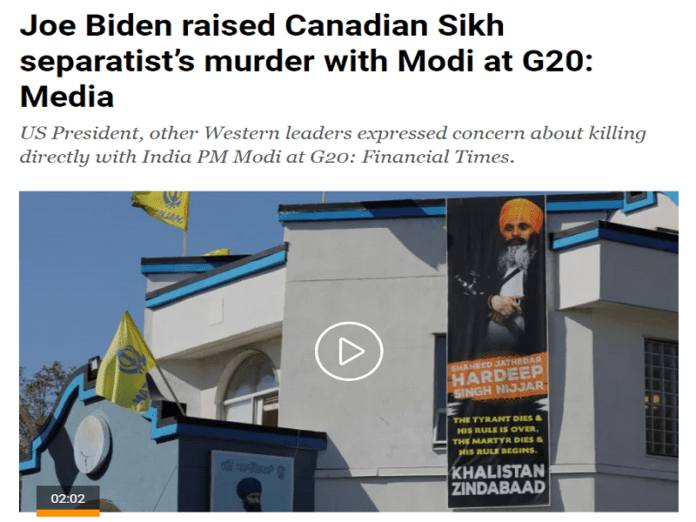The Financial Times reported that US President Biden and other leaders from the “Five Eyes” intelligence-sharing alliance discretely addressed Canada’s claims that India was behind the assassination of a separatist leader in that country in June who Delhi had earlier deemed to be a terrorist. They allegedly discussed this with Prime Minister Modi at the G20 according to sources, while the Associated Press earlier reported that one of that alliance’s members shared intel with Canada implicating India.
It was explained in this analysis here how the Indian-Canadian dispute is actually a clash between two polar opposite worldviews. The first’s is security-centric while the second’s is obsessed with human rights, with the former being criticized for focusing on security at the alleged expense of human rights while the latter is criticized for weaponizing human rights to endanger others’ security. The last-mentioned observation was shared by the esteemed Pankaj Saran in his piece for the Economic Times.
He previously served as Indian Ambassador to Russia and then Deputy National Security after that so his opinion is worth considering due to his extensive policymaking experience. Saran’s article argues that “being an advanced liberal democracy is no longer qualification enough for being a natural partner in the fight against terrorism, hate crime and separatism by violent means.” In support of this claim, he delves into Canada’s history of hosting subversive anti-Indian elements on spurious socio-political pretexts.
The latest dispute shows that Canada has no qualms about continuing to host such figures in spite of India sharing evidence that Ottawa’s refusal to extradite them upon its request puts lives in danger. The Trudeau Administration has taken the embrace of human rights to such an extreme that the lives of those accused of violent crimes are considered more worthy of protection than those innocent people’s lives halfway across the world that are threatened by them continuing to operate with impunity abroad.
It’s impossible for Canada to win this battle for hearts and minds across the world since only the radical minority of people who are indoctrinated with extreme liberal views just like Trudeau is support Ottawa’s twisted prioritization of human rights over India’s legitimate national security concerns. Furthermore, both among the West and the non-West alike, India has earned the reputation of being a reliable and trustworthy partner so few have any reason to doubt the legitimacy of its extradition requests.
The non-West has largely rallied behind India since many of these countries are similarly diverse and therefore share its security-centric concerns in this respect, but the latest reports suggest that some leading Western countries are flirting with the possibility of more openly supporting Canada. They’d do well not to get dragged by it into this dispute since they’re doomed to lose hearts and minds as a result, though that’s also not to say that they should openly support India either.
Rather, the best approach from the perspective of this New Cold War bloc’s objective interests is to strike a balance between the two through the sharing of perfunctory statements whenever their representatives are prompted by the media but declining to go any further than that. Proactive steps like those that were previously reported risk not only leading to mistrust between India and the West, but also discrediting the latter even more in the eyes of most non-Western societies.
The latest reports hint that there’s a very intense struggle behind the scenes right now between the liberal-globalist policymaking faction and the comparatively more pragmatic one over the future of the West’s ties with India. The first are willing to sacrifice their bloc’s hard-earned strategic achievements with country for the sake of signaling support for so-called “values” while the second wants to preserve these selfsame achievements for the “greater good” of their bloc’s geostrategic interests nowadays.
At present, the comparatively more pragmatic policymaking faction maintains its newfound influence over the US’ ties with India, whereas the liberal-globalists have obviously seized control of Canada’s. The interplay between these factions inside each Western country as well as among them, particularly within the “Five Eyes”, will determine whether others support Canada or leave it hanging. It remains to be seen what’ll happen, but the outcome will show which policymaking faction has come out on top in the West.







